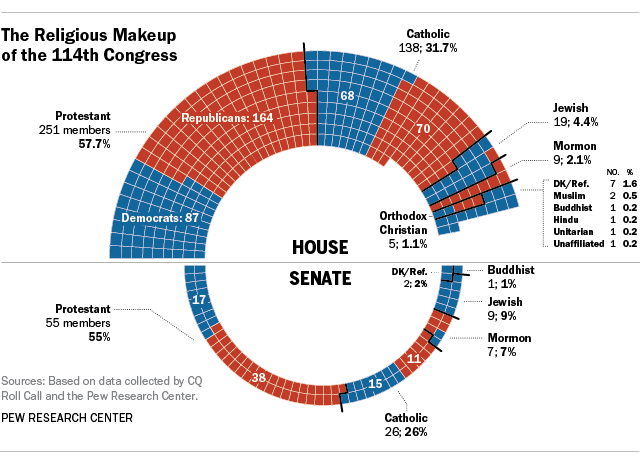When the new, 114th Congress is sworn in on Jan. 6, 2015, Republicans will control both chambers of the legislative body for the first time since the 109th Congress (2005-2006). Yet, despite the sea change in party control, there is relatively little change in the overall religious makeup of Congress, according to a new study by the Pew Research Center. More than nine-in-ten members of the House and Senate (92%) are Christian, and about 57% are Protestant, roughly the same as in the 113th Congress (90% and 56%, respectively).1 About three-in-ten members (31%) are Catholic, the same as in the previous Congress.

Protestants and Catholics continue to make up a greater percentage of the members of Congress than of all U.S. adults. Pew Research surveys find that, as of 2013, 49% of American adults are Protestant, and 22% are Catholic.
As was the case in the 113th Congress, the biggest difference between Congress and the general public is in the share of those who say they are religiously unaffiliated. This group makes up 20% of the general public but just 0.2% of Congress. The only member of Congress who describes herself as religiously unaffiliated is Rep. Kyrsten Sinema, D-Ariz.
Many of the nation’s smaller religious groups are represented in roughly equal proportion to their numbers in the U.S. adult population. Buddhists, Muslims and Hindus combined represent roughly 2% of American adults and 1% of Congress. Jews continue to have greater representation in Congress (5%) than in the population as a whole (2%), but there are five fewer Jewish members in the 114th Congress than there were in the 113th, and 11 fewer than there were in the 112th Congress.
The new Congress includes a number of people who have had some form of religious occupation, including at least seven members who are ordained ministers. The number of ordained clergy in Congress has not fluctuated greatly in recent years.
Of the 301 Republicans in the new Congress, only one – freshman Rep. Lee Zeldin of New York’s 1st District – is not a Christian. Zeldin, who is Jewish, will have far less seniority than the one Jewish Republican to serve in the 113th Congress, former House Majority Leader Eric Cantor, R-Va., who was defeated in his district’s GOP primary.
Fully two-thirds of the Republicans in the 114th Congress (202 members, or 67%) are Protestant, about a quarter are Catholic (81, or 27%), and 5% are Mormon (14).
Democrats in the new Congress are somewhat more religiously diverse than Republicans, though not as diverse as the population as a whole. Of the 234 Democrats in the 114th Congress, 104 (44%) are Protestant, 83 (35%) are Catholic, 27 (12%) are Jewish, two (1%) are Mormon, two are Buddhist, two are Muslim, one is Hindu and one does not identify with a particular religion. (Sen. Angus King, I-Maine, and Sen. Bernard Sanders, I-Vt., both of whom caucus with the Democrats, are counted as Democrats for the purposes of this analysis.)
(The analysis was completed before Rep. Michael G. Grimm, R-N.Y., announced his intention to resign effective Jan. 5. Grimm is a Catholic; his absence has a minimal impact on the overall percentages and trends presented in this report.)
These are some of the findings from an analysis by the Pew Research Center of congressional data compiled primarily by CQ Roll Call. CQ Roll Call gathered information on the religious affiliations of members of Congress through questionnaires and follow-up phone calls to members’ and candidates’ offices, and the Pew Research Center supplemented this information with additional research. The analysis compares the religious affiliations of members of the new Congress with Pew Research Center survey data on the U.S. public.





